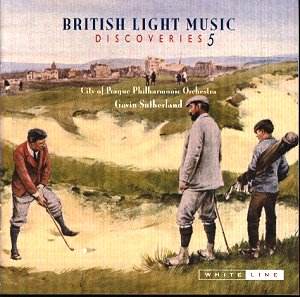It
is salutary to note that only two of the three composers in this
compilation, both of whom are no longer with us, provide what
was always the pre-requisite of light music – memorable tunes
that one could whistle or hum in the street. None of the others,
except perhaps David Lyon, provide anything like as good a strong
tune as Geoffrey Toye’s magical waltz from his ballet music for
The Haunted Ballroom – some not even a hint.
Peter
Hope best known for his Ring of Kerry suite has worked
for film composers James Horner and John Williams. His Kaleidoscope
has a colourful patina, embracing a wide variety of moods and
styles, as the title would suggest, and is a pleasant diversion
that showpieces every section of the orchestra. John Fox’s A
Pastoral Reflection is an amiable, fluttering pastoral ramble.
Paul Lewis’s Inauguration is an unoriginal pastiche of
Elgar, Bliss and Walton in ceremonial mood. Brian Douglas’s Music
for Strings is in three brief two-minute movements: a bracing
and jolly ‘Opening’ with a quiet interlude nodding back to 16th
- 18th century styles, and in the same olde-worlde
style, a drowsy ‘Minuet’ redolent of hot summer days, plus a bustling,
breezy ‘Finale’. Thomas Pitfield’s Overture on North-Country
Tunes is a good-humoured work employing a number of folk-tunes
including: ‘The Derby Ram’, ‘John Peel’, ‘The Keel Row’ and ‘The
Lincolnshire Poacher’. Amiable background music, all of these
pieces
Gavin
Sutherland’s glamorous Capriol Overture opens with a bang,
and is an attractive upbeat little work that recalls the dance
music of the ballet, the between-the-wars English musical theatre
and the great M-G-M musicals.
I
am a great admirer of the light music of David Lyon. [I recommend
Marco Polo’s album devoted to his music in their British Light
Music Series (8.225039)] Lyon’s Adagio Serioso is a lovely,
deeply-felt romantic little work and his Rondoletta a cheerful
quirkily attractive piece that might suggest a 19th
century carriage ride. These two little pieces come closest to
my criteria of memorable melody as a must for successful light
music.
Sir
John Barbirolli’s arrangement of music for the clarinet concerto
(probably for the Hallé’s principal clarinettist, Patrick
Ryan [from 1936 to 1958]), comes from movements from Handel’s
last four ‘concertos for solo violin, the fourth of Nine Sonatas
or Trios for two violins (or flutes or oboes), an aria from
Act II of Belshazzar, and the Second Organ Concerto to make up
its four movements. The result is typical 18th century
charm and elegance in an Andante, an Allegro, a Largo and a final
Allegro.
The
City of Prague Philharmonic Orchestra, is presumably used for
economic reasons rather than a British orchestra. Nevertheless
under the baton of Gavin Sutherland they acquit themselves very
well.
Except
for Toye’s The Haunted Ballroom, that is available elsewhere,
this collection is somewhat short on memorable melodies but it
makes attractive and undemanding listening.
Ian
Lace

